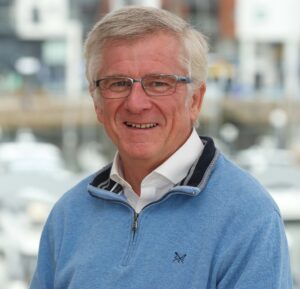 MNWB Chair Capt. Andrew Cassels reflects on his career at sea on International Day of the Seafarer
MNWB Chair Capt. Andrew Cassels reflects on his career at sea on International Day of the Seafarer
Seafaring is a challenging job for many reasons but it is also an exciting and professionally challenging career. ‘Go to sea and see the world’ was the call and I certainly did see the world… well most of it. If I had my time again, I would still choose a career at sea. I sailed on tankers around the NW European coast, the Mediterranean and Black Sea, the Far East, Australia and NZ and, of course, the Arabian Gulf (AG). On a globally trading tanker it is hard to avoid the AG for long. I managed to avoid North and South America almost completely, which is a bit of a shame. However, in 1982 I volunteered for service on a STUFT ship during the UK’s campaign to regain the Falkland Islands which had been invaded. A STUFT ship was the acronym given by the government for a civilian ship that was serving the military on the campaign. It stands for ‘Ships Taken Up From Trade’. There were many other exciting and interesting places visited that I probably would never have seen had I not chosen a career at sea.
That said, a career at sea meant leaving your friends and family for, in my day, 8 months out of every 12 which could mean missing many important life events from friends’ weddings to family funerals. The company will get you home for the serious things like immediate family funerals. But sometimes that is simply not possible as the ship is at sea or trading to ports where it is either impossible or not wise to head home from. I have even been waiting with bags packed a few days before Christmas when my relief failed to turn up… so I had to stay on. It that case, I got home 4 weeks later when everyone was ‘enjoying’ the January blues… all partied out and broke. It takes a certain type of person to do this but, with the advent of the internet on ships, being away from home is but a few clicks away.
One of the many roles that a ship’s Captain has is to care for the physical and mental wellbeing of the crew. If people need medical attention or need to be repatriated, it is the Captain who makes the arrangements. It is unusual for the spiritual needs of the crew to be addressed on board the ship. In many of the ports around the world a Chaplin will visit the ship to minister to the spiritual needs of the crew, usually regardless of their denomination. And in many ports around the world there is a seafarer centre usually run by one of the main Christian religions, the Mission to Seafarers or Stella Maris. I remember visiting seafarer centres in many continents around the world. They were like an oasis of friendly calm away from the hustle and bustle of the ship, its business and my daily routine helping to keep the ship trading efficiently.
It is often said that 95% of the goods we, the UK, import and export come to us by sea. That number can be argued but it is broadly correct… the vast majority of goods that are traded are transported by ship. That is because shipping is the most cost-effective way to move large quantities of goods over large distances. The number may vary country by country but for the UK as an island nation we would struggle without the services of merchant, commercial shipping and the crews that move the ship and its goods from one end of the world to the other.
